If you are a phone user in Nigeria, chances are you have spoken to or received an unsolicited text message containing fake recharge cards from some individuals claiming to have sent it in error. You probably know someone who has had an encounter with them, or someone who has been scammed or is about to be scammed. SODEEQ ATANDA uncovers these fraudsters.
Johnson Rachael, not real name, revealed something to this reporter in July. She said that fraudsters who send fake telecommunication recharge card digits to random phone users could be found in different locations in Ile-Ife, Osun State. Till September, we kept talking regularly on how to investigate the faces behind this pervasive crime. Many times, the source would tell me there were as many flashpoints in the ancient town as the numbers of scammers. Other times, Rachael told me about a particular area where the fraudsters frequently operated from. She, however, told me they could be deadly. “If you walk aimlessly and they suspect you, they can tag you a thief,” she said. “In seconds, people can gather and lynch you.”

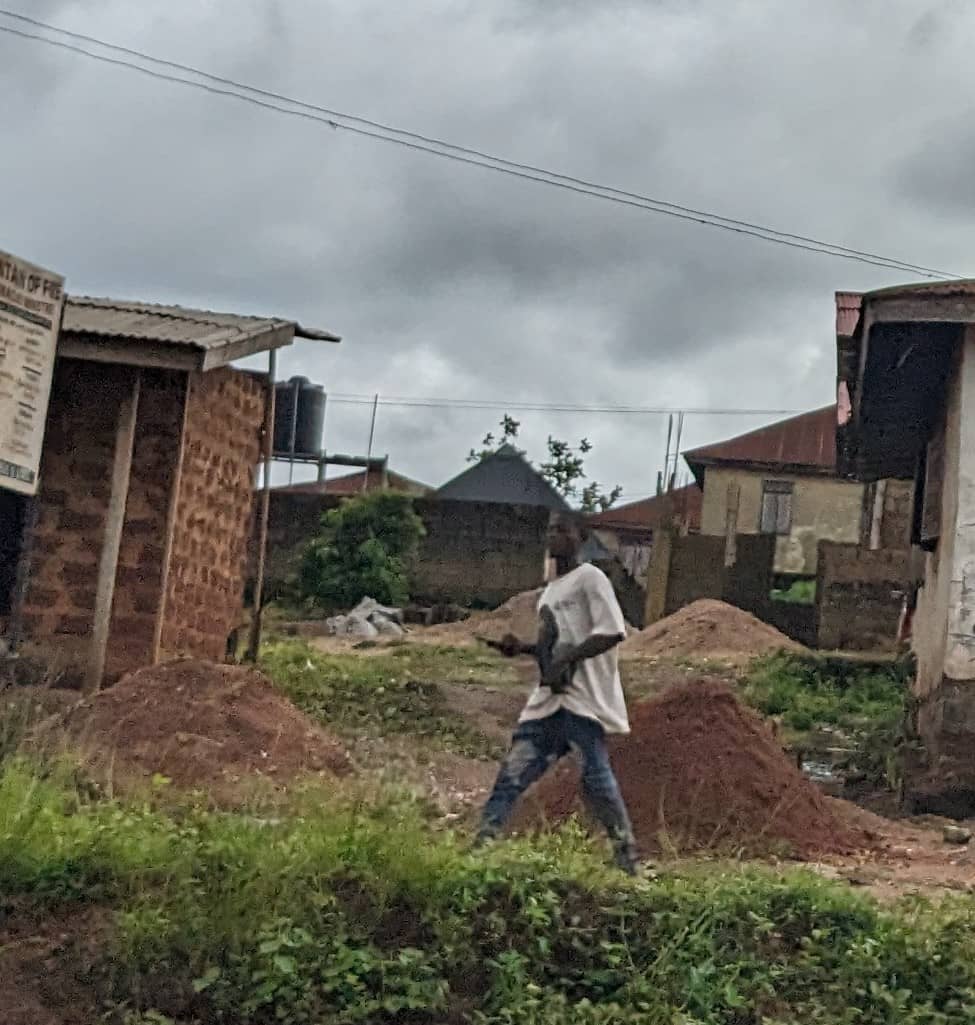
On September 7, a colleague received a strange text message from +2349161796134. From him, I took over the conversation and started playing along with a fraudster who switched between a young person’s voice and an aged man’s voice to convince me that he truly appreciated my return of his ill-intentioned airtime digits. He pretended to be an Ifa priest willing to help me solve a problem I had supposedly created for myself. He claimed I talked too much to people about my personal life and this was impeding my progress, and that he had a solution to it.
“Samuel is my name. My father wrongly sent N3,000 recharge card to you. Return it to him, please,” the imposter said.
The following day, he called back to ask if I had sent the card and I answered in the affirmative. “Thank you,” he said. “Your kinds are very rare, sir. My dad wants to appreciate you.”
Now speaking as an old man, he continued, “Thank you, my son. I want to help you. I am an Ifa priest and I sent the cards to you by mistake. It was meant for someone coming to attend my annual Ifa ceremony. For what you have done, I will help you. If I offer to help you become great, will you be kind in return?”
“I will ask you some questions; be truthful with your responses. Since you started your work, have you bought a vehicle of your own? Have you built your own house? If I ask you to do one or two things to make your life better, will you do them? You will buy a white handkerchief and one coconut to perform a ritual for you to become rich. You will send N4,500 that I would use to buy four bottles of Schnapps for a special ritual to complement your recommended ritual.
READ ALSO: Political Mortgage: The Flaws in Lagos State Government’s Housing Plans
Earlier, he had spoken to me for about two minutes and ended the call to consult his ‘oracle’ to diagnose an imaginary spiritual issue impeding my progress as a “motor park secretary in Lagos State”. Our conversation led him to forward an Access Bank account number belonging to one Ifayemi Ade. At this point, I backed out because I had got enough of him.
The conversation with the impostor propelled me to resume my conversation with Rachael, and based on new information from her, I journeyed to Ile-Ife. Before that, a basic check about Samuel’s phone number (+2349161796134) on Truecaller showed that there had been 63 spam reports against the number.

Of the four persons who shared their experiences on Truecaller, one Ose Money wrote, “A big lie. He scammed me too.” While the extent of Money’s loss to the scammer might not be known, his story of “me too” fills the mouths of many Nigerians who have encountered these scammers.
“HAVE THEY DUPED YOU?”
“Have they duped you?” was the first question Rukayat asked me when I introduced a conversation about the prevalence of these fraudsters in Ile-Ife.
Rukayat, an orange hawker, could not hold her laughter on September 22 in the Oke-Ayetoro area of the town. She is no stranger to the activities of these con artists, from phone calls and real-time experiences. She laughed her heart out as she spoke to me about how she had been phoned by scammers many times.
“You cannot see enough of these people. I think they use juju truly because sometimes they say things that correspond with one’s reality at the moment,” the hawker said.
“They have called me many times. There was a day I was selling roasted corn. It was a bad day. I had a lot of corn unsold. While managing my bitterness about poor sales, my phone rang. I thought it was my husband trying to ask why I was not yet at home. But it was one of these fraudsters saying he mistakenly sent a recharge card to me. I told him if he knew he was speaking with a poor corn seller he would not have dialled my number in the first place. It was as if I poured all my anger on the miserable fraudster.”
“In their early days, when they were still evolving, they constantly got many innocent people into their trap. But I think people have grown to understand their tricks now. They are in almost every neighbourhood in Ile-Ife, particularly areas in the emote corners of the community where strangers cannot easily locate.”
FIJ learned that identifying as Samuel, Samson or Michael in Ile-Ife could land someone in trouble because scam operators have bastardised those names beyond measure. Some residents mentioned that bearing those names could make someone look suspicious to people, particularly if one’s appearance is seen to be out of touch with culture.
“That name can land you in a police cell. It’s like a wanted name,” a mechanic who did not mention his name told FIJ.
“ILE-IFE IS THEIR HEADQUARTERS”
Ile-Ife is regarded as the birthplace of Yoruba race, their culture and civilisation. It is also a believed to be the home of mythic gods numbering about 401, according to Saburi Biobaku, a historian, in “The Pattern of Yoruba History”. In other words, Ile-Ife is perceived as the headquarters of Yorubaland. In the opinion of the residents who spoke with FIJ for this investigation, Ile-Ife is the imperial headquarters of these scammers. Although such scammers might exist in other communities and states, they cannot rival those in Ile-Ife, as this line of fraud originated from the community.
On September 21, when I arrived in Ile-Ife, an okada rider told me that the scammers were everywhere in the ancient town.
“If you go to Iremo, you will see them. They are also at different hidden spots in Oke-Ayetoro, Iloro and so many other places. This is their headquarters. They are almost everywhere,” the okada rider explained.
In the course of this investigation, more than 20 residents told FIJ how the scammers carry out their trade.
THE SCAMMERS’ HIDEOUTS
In the Iloro area of Ile-Ife, one of the places mentioned by the okada rider, the scammers abound. FIJ found two popular spots where these scammers operate freely. The fraudsters rub their illegality on the residents’ faces and it has now become normal. Indeed, many residents know these scammers and what they do.
As we rode on his motorcycle on Belewu Opa street in Iloro, the okada rider pointed at the scammers’ different convergence spots.
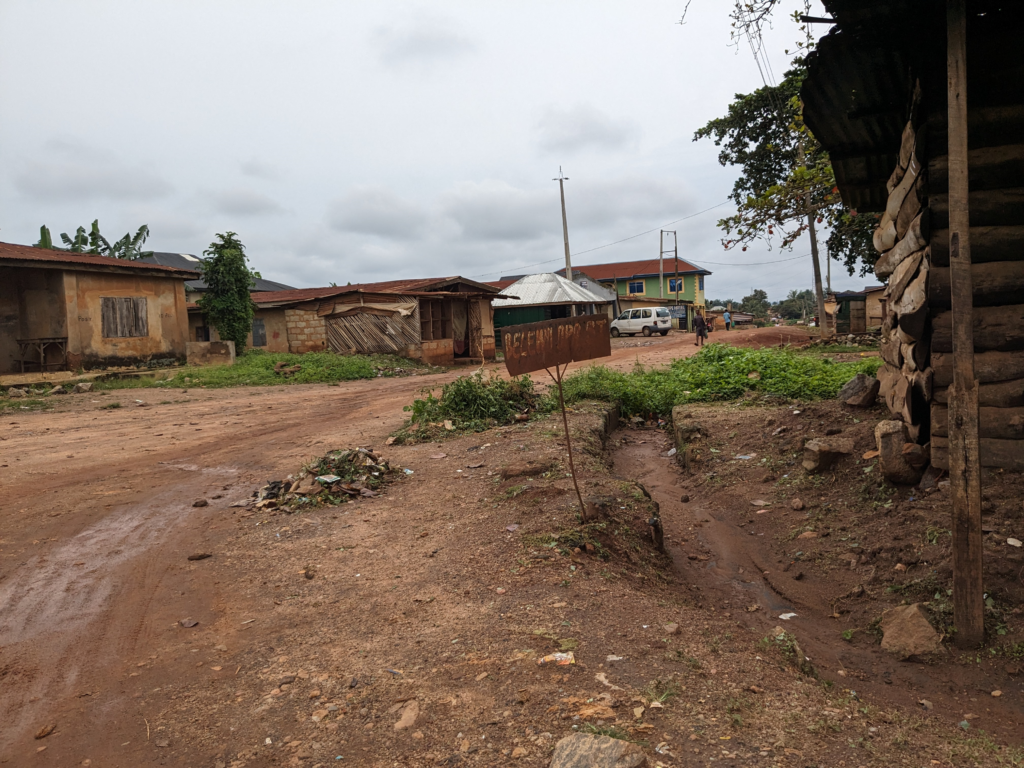
“We call them ‘Hello Baba’. This is because they usually change their voices to sound like an aged man. So, when you hear their voice, the first thing the call recipient would say is ‘Hello Baba,’” he said.
Some residents said any negligent parents risk making their children ready-made tools the scammers use in speaking with potential victims.
While on this street, FIJ learned that the young and old know the scammers. To the extent that the scammers are known, many people could not identify them by their names. Anyone identified as doing the criminal activity would automatically be called ‘Hello Baba’.
FIJ found some scammers in the backyard of Baale Opa of Ile-Ife on Lakogba Street, Iloro. During a visit to this hideout on September 23, we saw six young men virtually all holding small handsets dialling prospective victims’ phone lines and laughing at their experiences after speaking with soft targets.
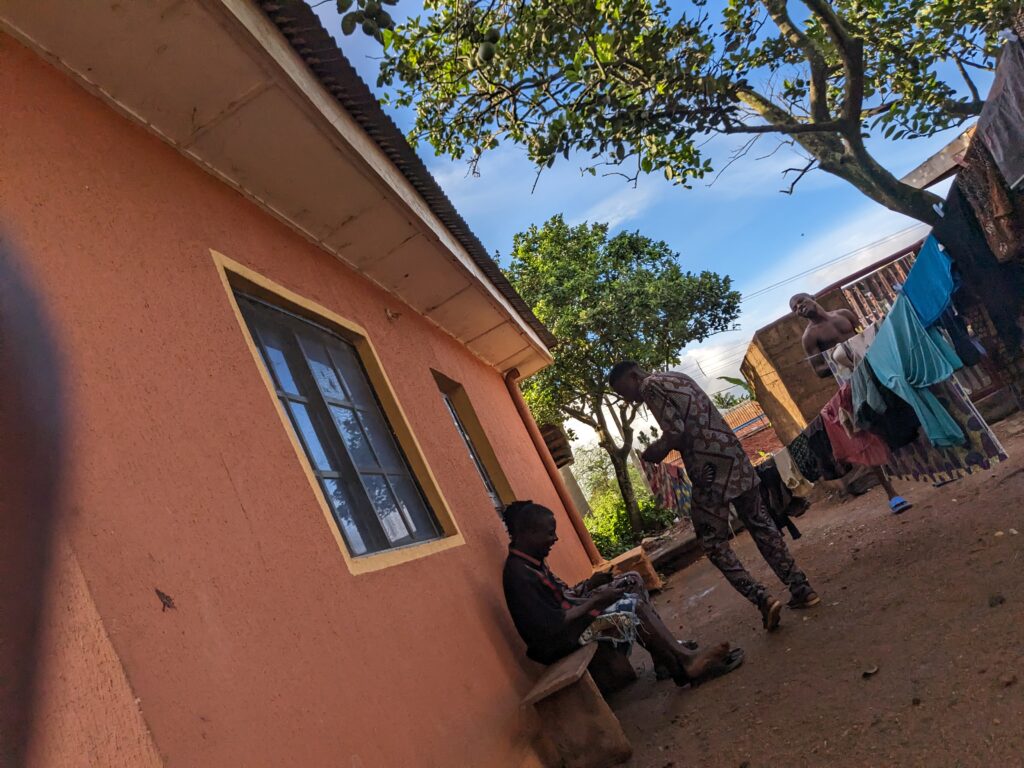
Two of the six scammers excused their partners in crime and moved some metres away to phone different contacts. Sitting in front of an uncompleted building, the two men were observed dialling numbers on their respective phones.
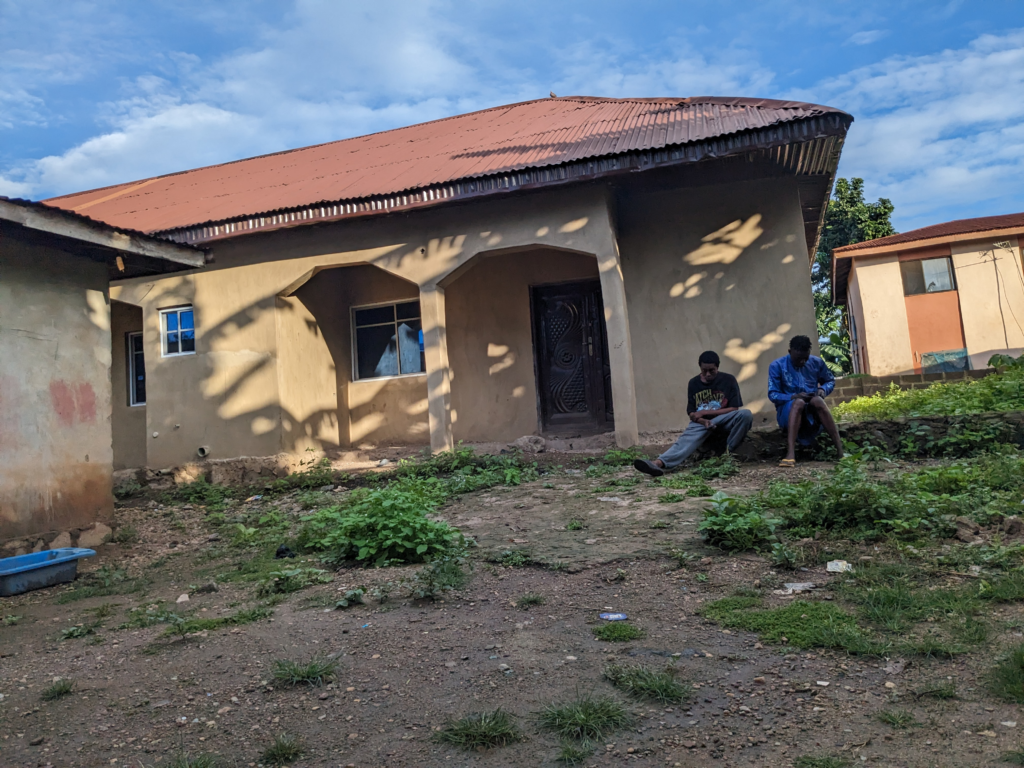
One of them, identified as Blessing, was said to be the son of Baale Opa. According to a resident, who asked not to be named, Blessing used to be a tailor. After he became his own boss, he abandoned his shop and found delight in scamming people via phone calls.
“Blessing is one of the ‘Hello Baba’ guys and son of our Baale. He was once a tailor. Look at his shop. I can remember police officers once came here to arrest some of them, but they were later released. I don’t know if Blessing was among the arrested ones, but I did not see him after the police came,” the resident said.
Another spot was found at a football viewing centre off Belewu Street. However, various sources said that this particular spot was not as notorious as the one down some stretch of the street. “Some ‘Hello Baba’ scammers come here regularly, and I do see them speak on the phone with victims. If they notice that it is noisy inside, they can go outside where it is calm and continue their conversation,” a source, who frequents the centre, told FIJ.
Some metres down the street is an old building owned by one man popularly known as ‘Halleluyah’. Painted in blue on the façade and red on the side walls, the rough-looking house has endured a lot of rainfalls and sunlight, but it is still clinging to the ground beside an erosion-ravaged land, evoking tales of domineering traditional townhouses in the ancient town.
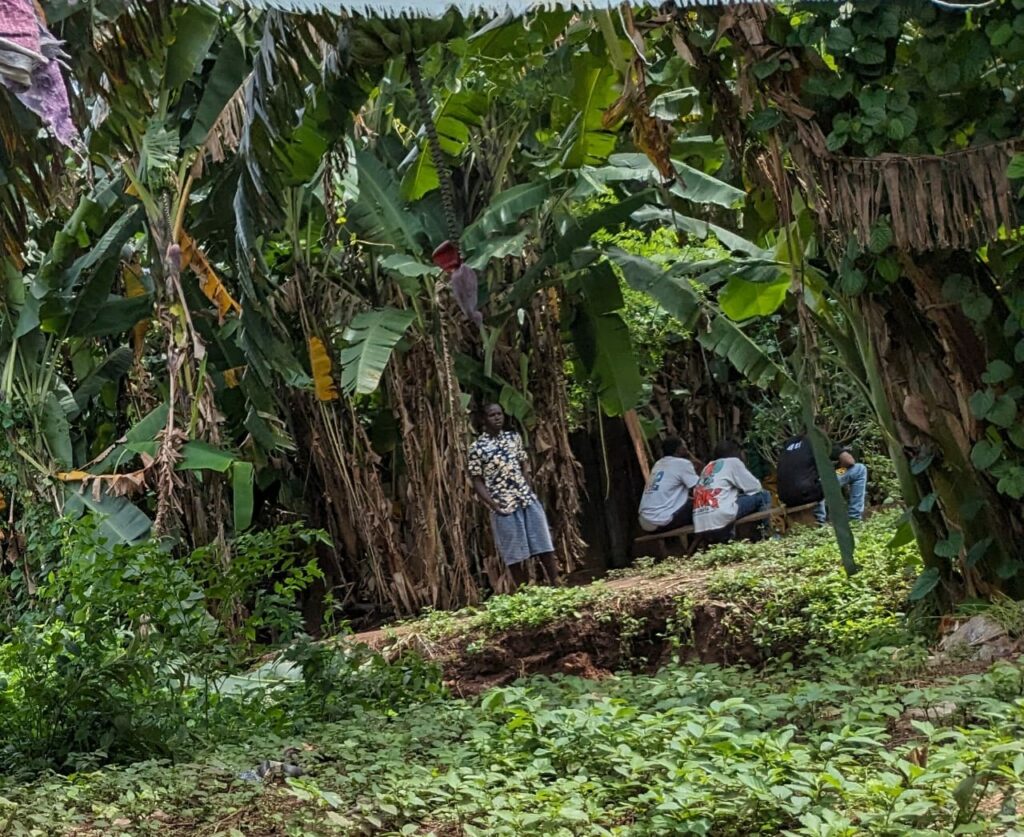
At the back of the building, tall and sturdy banana plants serve as a safe haven for the fraudsters. In this territory, they call the shots, drink various substances and smoke heavily. It is like a restricted area, as there is no pathway for people to pass through the precinct. This reporter’s move to merely pass through the grassy terrain was harshly rebuffed by the man standing in the image above wearing a crop top and a short knicker.
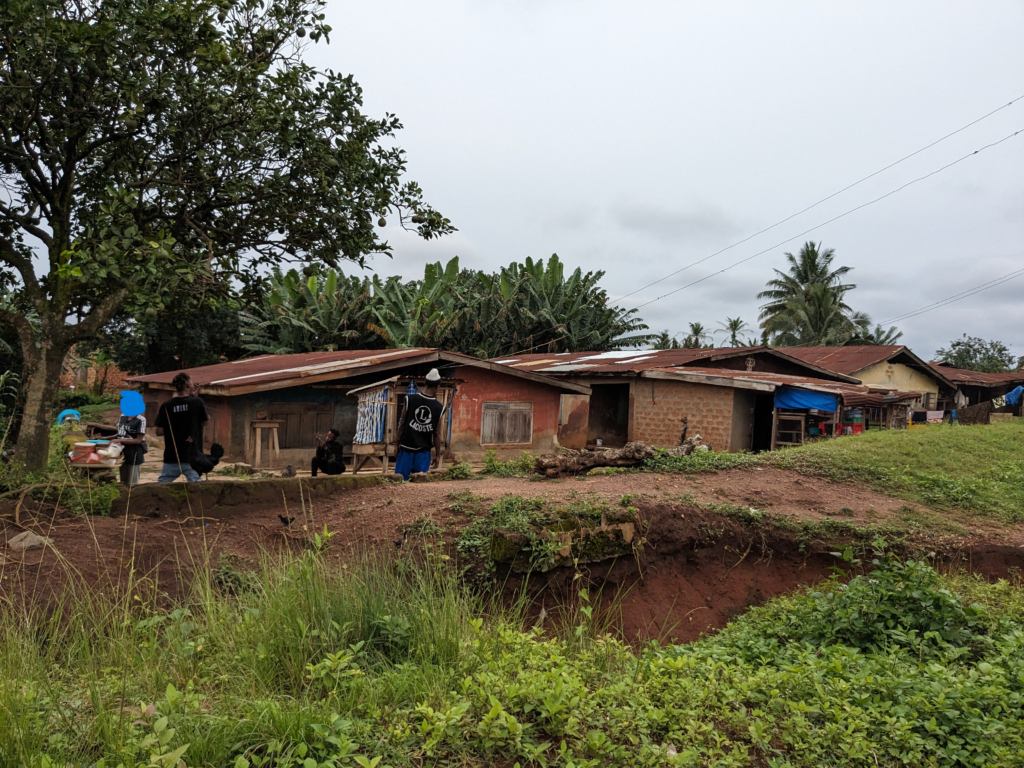
Other than the ancient story Halleluyah’s house has to tell, it also tells the story of con artists living in and hiding under its covers to dupe unsuspecting members of the public. It is a witness to many open and discreet conversations Hello Baba scammers have had and continue to have with innocent Nigerians.
“WATER NO GET ENEMY”
Fela Anikulapo-Kuti released his hit album named “Expensive Shit” almost 50 years ago. The album features “Water No Get Enemy,” a track that derived its name from a Nigerian proverb, “Water has no enemy.” The song, which portrays the indispensability of water to human life, became an agent of social change against the military highhandedness of the 1970s.
In front of Halleluyah’s house, Wale turned Anikulapo-Kuti’s sonorous “water no get enemy” to something to manipulate an innocent man into believing him as a spiritual leader. From their conversation, FIJ observed that the man on the other end of the call identified himself to Wale as Muhammed Eyinkangogo and the call lasted over three minutes on September 22.
Some hours after the botched call with Eyinkangogo, Wale initiated another phone call. Seyi, on the other hand, resumed speaking with someone, likely a woman he had earlier spoken with. Speaking with the woman with their usual fraudulent line, Seyi said, “Thank you for the card; we have loaded it.”
WALE TRYING TO SCAM A MAN
“My son, God bless you. God will answer your prayers o. If I help you, are you not going to be ungrateful to me? Promise me that you will not forget me in your life.
“Excuse yourself from where people are. Have you have left?
“You know that water has no enemy. Water has no legs. Water has no hands. But water can carry many things away. Or is it not so?
“My good son. Do you know anointing oil? You do hear about it, but you don’t know it?
“Do you know dabinu [dates]. It is dabinu I will use to perform spiritual prayers for you. Do you have plenty money?
“In Sha Allah, you have become a millionaire.
“Muhammed, how will you get 10 congos of dabinu for me. I will use it for your prayers now now. Or if you can buy tubers of yams and send it to me through a commercial bus.
“Or do you want to speak with my son and send money to him to go and buy the yams?
“Which option do you take? So that I can start your spiritual prayers. How do you want to do it, Muhammed Eyinkangogo?
“God bless you. How do you want to buy the dabinu so that it would be delivered to me?
“It’s God that will do anything I say, not me. Oh! So, you are not ready to help yourself. You said people don’t patronize your business well.
“And I want to help you out. You are a greedy man. You don’t want to remove anything from your account. You don’t want to give money to anybody. You are a foolish person. God will punish.
The so-called Eyinkangogo that Wale was trying to defraud appeared to have been aware of the trick Wale was trying to play on him. This is clear from the tone of Wale’s words towards the end of the conversation. As the potential victim was unyielding to part with his money, Wale resorted to abuse and curse, the usual reactions of such fraudsters when potential victims are not bending to their antics. Eyinkangogo might mentioned a wrong name, just like I did in my earlier-mentioned conversation with Samuel, in order to protect his true identity from the serial fraudster, however.
WALE TRYING TO SCAM A WOMAN
“
Hello, it’s a woman that mistakenly sent a recharge card to you. Help me check it. It was Iya Sukura that wanted to send it to Daddy Mopele.
“The man that owns the card is here. Let me transfer the call to him. He’s an aged man. [He changes his voice to sound like a true old man and continued with the call].”
Behind Wale, Seyi was also speaking with a potential victim. “Thank you for the card; we have loaded it.”
HOW THEY OPERATE
Usually, these scammers do not have time for humours and do not attempt to create one. But they are great at setting emotional traps for unsuspecting citizens. They are young, not old as they would want the public to believe. They could work as ring leaders to minors who would speak to victims at different stages of their conversations in order to get material advantage.
Some residents revealed that these scammers sometimes have a list of multiple victims who look promising. Once they get initial proceeds from a call, they would document the number and keep phoning the person from time to time in order to sustain milking them.
Rukayat, whom we had earlier mentioned, told this medium how members of a scam ring in her neighbourhood often hold and shake gourds when speaking with their preys over the phone to pretend as true traditional priests. “Those ones behind our house even have a secret and quiet place. When they have a bright catch and their conversation has proceeded to a certain stage, they can begin to start shaking traditional gourds and give some sound to make the person feel they are performing a ritual or consulting an oracle.
“Anytime we see them buy electronics and other luxury materials, we know that they have definitely scammed someone out of good money. They have smaller phones and dedicated phone numbers for calling people.”
They are controlling, and they understand all the cheat codes that could make an undiscerning mind fall victim. Unlike other scamming niches, these people are not relationship scammers and don’t profess love feelings. Before or immediately after they have texted, they would ask for a return of their fake airtime digits.
The next thing from them could be that something or someone is responsible for a misfortune in one’s life and that they can solve the problem with their false traditional powers. It might take weeks for someone who has innocently fallen into their net to realise this, however.
It is difficult to track them on digital platforms because they assume fake identities and even make use of stolen phone numbers or numbers registered in someone else’s name.
Residents said police arrested some of them in the past but they were soon released. They accused the police of turning the scammers to a money machine through occasional arrests. However, Yemisi Opadola, the Osun State Police Command Public Relations Officer, told FIJ on October 5 that she had never heard about such arrest.
Unless otherwise stated, the sources mentioned in this investigation are represented with pseudonyms to guarantee their security.
This report was produced with support from the Wole Soyinka Centre for Investigative Journalism (WSCIJ) under the Collaborative Media Engagement for Development Inclusivity and Accountability project (CMEDIA) funded by the MacArthur Foundation


